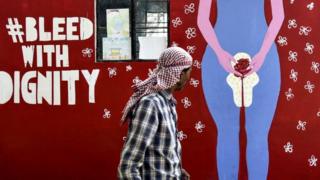- UID
- 20
- Online time
- Hours
- Posts
- Reg time
- 24-8-2017
- Last login
- 1-1-1970
|
|
━━━━━━━━━━━━━━━━━

▼ Two pieces of very disturbing news involving working women and menstruation have emerged in India in recent months.
Periods have long been a taboo in the country, menstruating women are believed to be impure and are still excluded from social and religious events. In recent years, these archaic ideas have been increasingly challenged, especially by urban educated women.
But two incidents show that India's very problematic relationship with menstruation continues. A vast majority of women, especially those from poor families, with no agency and no education, are forced to makes choices that have long-term and irreversible impacts on their health and their lives.
The first incident was in the western state of Maharashtra where thousands of young women have undergone surgical procedures to remove their wombs in the past three years - in a substantial number of cases so that they can get work as sugarcane harvesters.
Every year, tens of thousands of poor families from Beed, Osmanabad, Sangli and Solapur districts migrate to more affluent western districts of the state - known as "the sugar belt" - to work for six months as "cutters" in sugarcane fields.
Once there, they are at the mercy of greedy contractors who use every opportunity to exploit them.
To begin with, they are reluctant to hire women because cane-cutting is hard work and women may miss a day or two of work during their periods. If they do miss a day's work, they have to pay a penalty.
The living conditions at their work-place are far from ideal - the families have to live in huts or tents close to the fields, there are no toilets, and as harvesting is sometimes done even at night, there is no fixed time for sleeping or waking. And when women get their periods, it just becomes that much more tough for them.
Because of the poor hygienic conditions, many women catch infections and, activists working in the region say, unscrupulous doctors encourage them to undergo unnecessary surgery even if they visit for a minor gynaecological problem which can be treated with medicine.
As most women in these areas are married young, many have two to three children by the time they are in their mid-20s, and because doctors don't tell them about the problems they would face if they underwent hysterectomy, many believe that it's okay to get rid of their wombs.
This has turned several villages in the region into "villages of womb-less women".
After the issue was raised last month in the state assembly by legislator Neelam Gorhe, Maharashtra Health Minister Eknath Shinde admitted that there had been 4,605 hysterectomies just in Beed district in three years. But, he said, (▪ ▪ ▪)
► Please, continue reading this article here: Source |
|